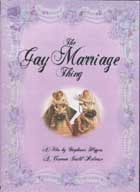
The Gay Marriage Thing 2005
Distributed by Cinema Guild, 115 West 30th Street, Suite 800, New York, NY 10001; 212-685-6242
Produced by MasterPeace Productions
Directed by Stephanie Higgins
DVD, color, 47 min.
Jr. High - Adult
Gay and Lesbian Studies, Gender Studies, Human Rights, Law, Women's Rights
Date Entered: 10/12/2006
Reviewed by Rob Sica, Eastern Kentucky UniversityEach of these nonfiction works provides an emphatically sympathetic portrait of lesbian and gay couples from various walks of life who want to partake of the legal sanction and cultural acceptance of matrimonial commitment enjoyed by heterosexuals. That these films are clearly works of advocacy which can be easily positioned in the ongoing debate over same-sex marriage does nothing to diminish their value as wholesome reminders of the robust community of interests and aspirations spanning across the (variously porous) borders of sexual orientation, political persuasion, and religious affiliation.
Stephanie Higgins’ The Gay Marriage Thing confines most of its attention to Lorre and Gayle, a suburban thirtysomething lesbian couple in Massachusetts celebrating their fifteenth anniversary a year after the State Supreme Court upheld the constitutionality of same-sex marriage. Their extended family, members and personages of several churches, state political figures, and protestors outside the State House are also featured as part of the environment affecting the daily lives of the couple.
While no less heartfelt, Jim de Sève’s Tying the Knot is considerably broader in its compass, and therefore a richer source of material for forming arguments in favor of gay marriage, ranging as it does among several personal stories, history and politics. The most emotionally powerful moments come from the stories of Mickie and Sam, who, widowed by their long-term same-sex partners (one, a police officer killed in the line of duty; the other, an Oklahoma rancher), poignantly illustrate the need for extending the legal protections and responsibilities of marriage beyond the confines of heterosexuality. These profiles are intermingled with appearances by gay conservative columnist Andrew Sullivan, What is Marriage For? author E.J. Graff (who discusses the historical malleability of marriage as an institution), Dutch legal expert Kees Waaldjik, and television excerpts of former Republican Congressman Bob Barr, and, among others, Focus on the Family founder James Dobson. Additionally, de Sève contrasts the federal restrictions upon marriage with policies and attitudes in Vermont, Massachusetts, San Francisco, Canada, and Holland.
Though Tying the Knot is preferred for its wider historical and political scope, both titles are recommended to all public and academic libraries.